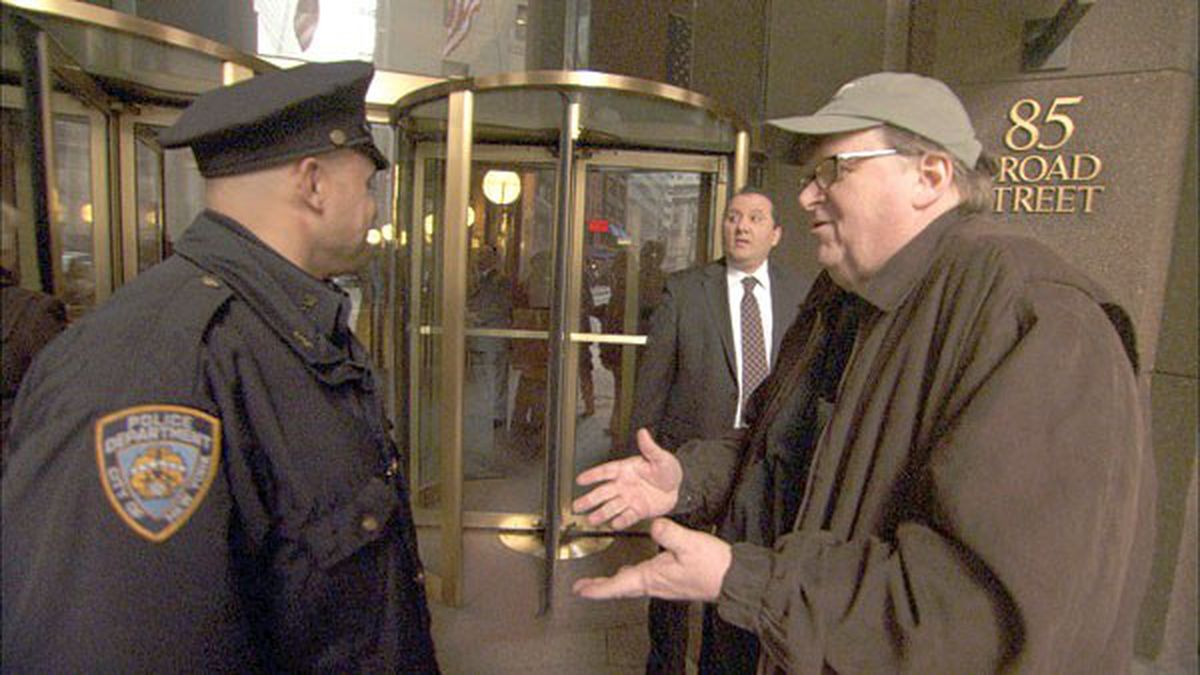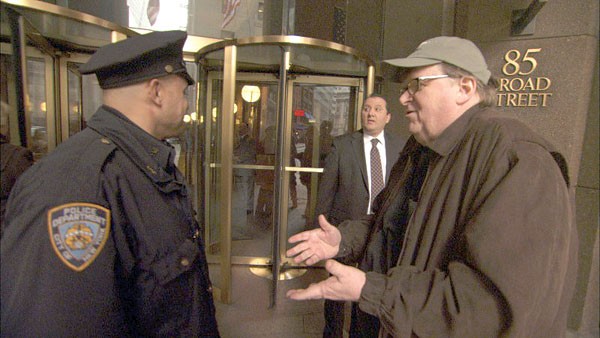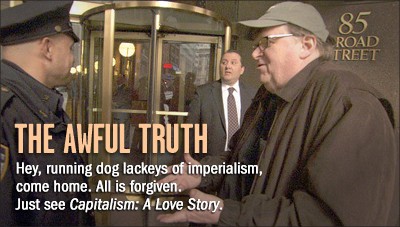Michael Moore grew up believing in the American Dream, the Roman Catholic Church, the share-the-wealth New Deal liberalism of Franklin D. Roosevelt, and General Motors. Well, three out of four ain’t bad.
GM finally got its comeuppance in 2009, twenty years after Moore raked it over the coals in Roger & Me for devastating his hometown of Flint, Michigan by drastically cutting its car and truck workforce in the 1980s. That first Michael Moore documentary, arguably his finest, not only ushered in a new wave of advocate filmmaking but put the rotund, soft-spoken son of a factory worker on a quest. One by one in his feature-length docs and TV shows, Moore tore into a series of American industries — oil, guns, insurance, banking, booksellers, health care, etc. — for putting profits ahead of people. Liberals squealed with delight; conservatives frothed at the mouth, then produced inept imitation Moores that tried in vain to discredit him. He refined his technique and has since become the most popular and influential maker of documentaries in American film history.
Moore’s righteous indignation toward corporate America has all the wounded passion of somebody jilted in love, hence the title of his latest, Capitalism: A Love Story. You don’t have to study Moore’s films very closely to recognize that he’s perpetually trying to reconcile the preconceptions of his relatively privileged middle-class youth with the cold, hard realities separating the haves from the have-nots. It just wasn’t supposed to turn out this way for a guy who stayed in school, went to work, paid his taxes, and played by the rules. We’ve been cheated, says Moore, lied to, stolen from, entertained with bread and circuses, and used as cannon fodder in wars of plunder — much the same as in ancient Rome. Do the terms “oligarchy” and “plutocracy” ring a bell?
At one end of the Moore ethos is the roughhouse spirit of the original United Auto Workers, who endured vicious attacks by police and company goons before finally forcing GM to provide employee benefits that many people take for granted today. They didn’t do it on Twitter, they took over the factory in a mass sit-in until their demands were met. On the other end of the Moore spectrum are the moral lessons he absorbed in Catholic school in Flint — all that do-unto-others stuff. Young Michael (he was thinner then, and looked a lot like Beaver Cleaver) paid attention and later, when he saw a giant corporation picking on its employees, outsourcing their jobs, and ditching their pensions, he fought back with the example of organized labor and the nuns and priests behind him.
Capitalism: A Love Story reportedly came about when Moore decided to pull back and present the big picture, rather than attacking symptoms of socio-economic injustice piecemeal. The Great Recession obviously plays a major part in the spectacle, but there are more than enough outrages to go around. Any movie that starts with Iggy Pop thrashing out “Louie Louie” over a security-cam montage of bank robberies, and ends with a cocktail-lounge version of “The Internationale,” is automatically noteworthy. The movie lives up to its hype in its first five minutes and builds from there. It’s the Awful Truth in big, bold letters.
“Dead Peasant Insurance” is a typical nasty little item. Some companies take out life insurance policies on their employees without informing them, then collect the death benefits. The film doesn’t exactly draw a connection between this practice and the denial of health benefits to lower-level workers, but it’s intriguing — an employee could be worth more dead than alive. Charming. Wait, there’s more. A Florida company called Condo Vultures is doing brisk business buying up foreclosures for pennies on the dollar. Teenagers in Wilkes-Barre, Pennsylvania are being rounded up for petty offenses and incarcerated in a privatized “child care” center set up to qualify for federal funding. And the next time you fly somewhere, better hope your non-employee, “independent contractor” commercial airline pilot isn’t so underpaid that she or he has to moonlight to make ends meet. Makes ’em sleepy.
When did the ordinary American worker start slipping down the ladder? Moore blames the age of Reaganomics. The rich took firm control of national policy during the presidency of the “Great Communicator.” The result was the dismantling of the country’s industrial infrastructure in favor of offshoring, union busting, wholesale deregulation of business, mini-wars, and the sudden, almost overnight appearance of homeless persons on the street. Thirty years later, Wall Street is an “insane casino,” the government bails out the financial industry with public money, corporations continue to reward failure with obscene bonuses for upper management, the poor have never been poorer (Katrina, etc.), and the rest of America has turned into Flint. The climate of fear is palpable and pervasive. It took a long time for the bad news to sink in, but now Moore, echoing one of three priests he interviews, is ready to label capitalism itself as evil and unjust.
Moore can’t resist taunting rightwingers with a fun montage of Red Square Mayday parades and such, but he soon gets down to a few dead-serious suggestions: Don’t leave your home when it’s foreclosed on. Do as the employees of Chicago’s Republic Window & Door factory did when Bank of America shut down their company and sacked them without pay — stage an old-fashioned sit-in. They eventually won. Start a co-operative business. Emulate the Berrigan brothers, Philip and Daniel, two priests who never stopped fighting for downtrodden workers. Also emulate Dr. Jonas Salk, who instead of selling his polio vaccine to a drug conglomerate for a profit, donated it to the public good. Insist on health care as a human right. Keep a close eye on Obama. And practice democracy. Democracy is the cure.
After all the bad news in Capitalism: A Love Story, it’s difficult to walk out of the theater in a celebratory mood, but Moore does his best — and this film is certainly one of his best — to remind us that it doesn’t necessarily have to be this way, as long as this country is a democracy. Before the end of WWII, President Roosevelt (who was denounced by Republicans as a socialist, too) devised a Second Bill of Rights that promised such things as a right to jobs and a right to free health care. Despite being adopted by other nations, it was never enacted in the United States. Proclaims Moore: “We deserve FDR’s dream.” That may be one reason why Moore is sponsoring numerous free screenings and benefit showings of this film. He may be slightly over-optimistic, but he’s not afraid to fight.















